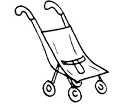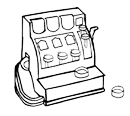The return from nappies: everything you need to know
In the family of little pleasures linked to post-partum, I ask: the return of nappies. So don't worry, despite its name, this event does not mean that you will regress physically to the point of wearing nappies. No, that's in the family of little pleasures of old age. One thing at a time, don't be in such a hurry. So, what is the return of the nappies?
This term simply refers to the return of menstruation, i.e. the first menstrual cycle following the childbirth. Well, all good things must come to an end! We've been menstruating for 9 months and yet, without s'announcing it, it's back again to add a little extra challenge to our bodies, which are just recovering from the biggest effort of their lives. Further proof, s'was needed, that women are tough as nails and their bodies are war machines. #WeAreWoMUM
When does the nappy return occur?
Would you like a date? Ah well no. That would be far too simple. You'd risk anticipating it, which wouldn't be fun. The first period and the return of diapers have one thing in common: l'surprise effect'. I'm sorry, but it's impossible to predict the exact timing of the return from childbirth. Every woman is different, every pregnancy is different, every postpartum period is different and so is every return. It can even vary from one pregnancy to another in the same woman.
The arrival of the first post-delivery menstrual period can be delayed (although this is no guarantee) in breastfeeding women, since lactation can sometimes block the functioning of the ovaries and thus prevent ovulation, and without ovulation there can be no menstruation. But it all depends on the frequency of feedings and whether s'it s's a case of full or mixed breastfeeding. Despite breastfeeding, from the 3rd month onwards, menstruation may still return. For non-breastfeeding women, it occurs on average between the 6th and 8th week after delivery. But bear in mind that all these figures are only averages.
Don't confuse the return of nappies with lochia
Lo what? Lochia is the loss of blood immediately after the birth of a baby. And there's one more little pleasure! Just ask, girls: when it's gone, it's still there. Lochia can last several weeks, and is characterized by being very abundant in the first 72 hours after ldelivery. After that, they diminish as the days go by. Another characteristic is their fluctuating color. First red, then pink and finally brown. The purpose of this discharge is to clean l'uterus, to eliminate all the mucous membrane and vessels that fed the placenta. Lochia often contains blood clots. This is normal, and a sign that the cervix of l'uterus is beginning to heal.
Not just rules
Not always. The return from childbirth can sbe more intense. The warning signs are often the same as those of classic premenstrual syndrome: sore breasts, tension in the lower abdomen, fluctuating moods, fatigue and so on. However, the first post-delivery blood loss may be heavier, longer and more painful than before. But don't panic: this doesn't mean that all your menstrual cycles will be like this from now on. Don't hesitate to contact your gynecologist or midwife if you have any concerns or questions.
The trap to avoid
Don't want to have one baby after another? Then bear in mind that ovulation can precede a return to childbirth, so you could be fertile even before l'the arrival of your period. The rumour that breastfeeding would l'have the effect of a contraceptive is absolutely false. For some, getting pregnant again just a few weeks after giving birth is a dream, for others it's l'an absolute fear. To stay in control of your body, remember to use contraception during intercourse. If you are breast-feeding, ask your gynecologist for advice to ensure that everything is okay for you and your baby.
The good news
In the end, as much as we grumble about our periods coming back, it's actually a good thing, as it means that nature is taking its course and that the body is starting to function "normally" again after pregnancy and the childbirth. Moral: women's bodies are incredible. It's alive and life-giving, and for this reason it deserves all your attention, kindness and patience. Eventually, everything will return to l'order.
#milkawayapparel #inmumwetrust #wearewomum #teamwomum #postpartum #postpartumjourney #postpartumhero #postpartumbody #retourdecouche
Illustration credit: Unsplash - Monika Kozub





